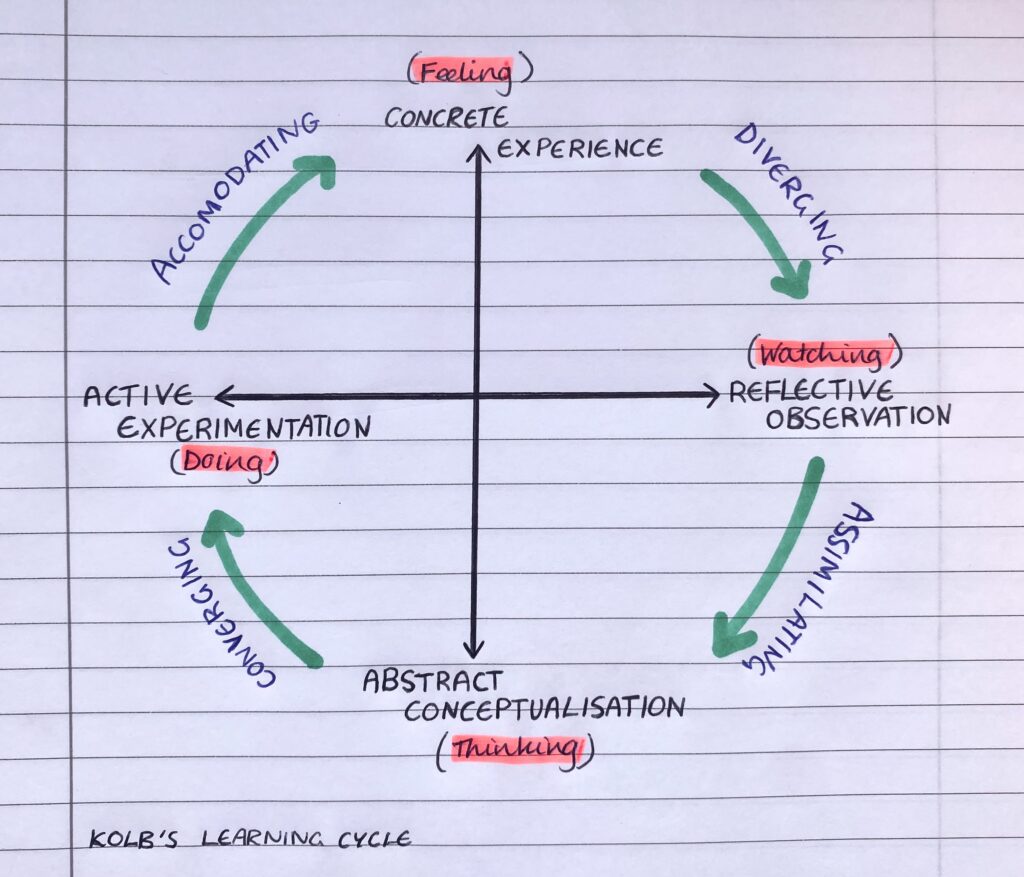Most our learning experiences throughout life from Primary to Higher Education will have been a passive one. Experiential Learning is active learning experience that encourages individuals to be present psychologically as well as physically. This process is specific and designed to engage the individual as well as the team as a whole (if applicable).
What is experiential learning?
Experiential learning is more narrowly defined as learning through reflection on doing; based on the premise that you need to develop hindsight to learn.
Historical Background:
David Kolbe is most famously associated with the development of Experiential Learning Theory (ELT) and helped embed the concept in educational theory and practise. He formalised the concept with the Experiential Learning Cycle, and the model includes four stages: Concrete Experience, Reflective Observation, Abstract Conceptualisation, and active experimentation.
Although the idea that ‘just doing the actions aren’t enough to develop long-lasting learning’ has been around for a long time. Aristotle premised this in his ‘learning by doing’, which influenced much of early thought about how humans learn.
Other honourable 20th century mentions include American philosopher and educator, John Dewey and his book Experience and Education (1938), psychologist Kurt Lewin (1940s-1950s), and developmental psychologists Jean Piaget & Lev Vygotsky (also Mid-20th Century)
Kolb’s Experiential Learning Cycle:
Deep learning occurs when all four sides of this cycle are engaged with, when the learning process is brought into awareness, it can magnify the effect.
Concrete Experience
Learners engage in a new experience or reinterpret an existing one. This is the “doing” stage, where hands-on experience forms the basis for learning. Example: Participating in a group activity or trying out a new skill.
Reflective Observation
Learners review and reflect on their experience.They analyze what happened and observe the experience from different perspectives. Example: Thinking about what worked, what didn’t, and how things could have gone differently.
Abstract Conceptualisation
Learners develop new ideas or modify existing concepts based on their reflections.They use their reflections to form theories, concepts, or generalisations. Example: Formulating a strategy or principle based on lessons learned.
Active Experimentation
Learners test their theories and apply what they’ve learned in new situations. This stage involves planning and trying out new actions to see if their concepts hold true. Example: Using the new strategy or approach in a future task or problem.

The 6 Propositions of Experiential Learning:
-
- A learning outcome is not the endpoint but a milestone of an ongoing learning process
- As we learn new ideas, we also modify and dispose of old ones
- Effective learners are capable of balancing opposing models of the learning cycle.
- Learning never ends, it is continuous.
- When learners and the environment interact, both are changed, we do not simply respond to the environment, we co-create it to meet out needs.
- Every field requires unique skills and a special learning process.
Application in Learning & Development
Role of the Educator in Experiential Learning:
The role of the education in experiential learning is many things which includes encouraging curiosity and openness, creating a psychologically safe environment, providing autonomy and ownership of the learning experience to the team or individuals in additions to incorporating the full learning cycle. This means that the educator must remain agile and responsive in their approach, providing ‘curve-balls’ and maintaining spontaneity to keep the learners engaged and the learning novel.
Designing bespoke hands on learning:
A learning and development educator facilitates experiential learning for individuals and teams by designing specific and hands-on learning experiences which target core competencies requiring development.
Facilitating reflection:
After activities, structured debrief sessions will be organised where individuals discuss their experiences, share insights, and explore how their actions contributed to outcomes.
Peer feedback will also be facilitated to encourage reflection on each others performance as a whole, giving a chance to offer constructive insights. This deepens the reflective process and helps employees see different perspectives.
Benefits and Challenges of Experiential Learning:
-
- Disrupts perceptions and narrowed mindsets, leading to more engagement and curiosity.
- Forces people out of their comfort zones.
- Our hands-on learning experiences not only allow individuals to contribute mentally but also physically towards tasks and challenges, encouraging active participation and enhancing creativity through problem solving. This dynamic approach enhances the development of critical thinking skills
- Engages emotions as well as knowledge and skills, leading to a more holistic experience, greater gratification in learning, and enhances retention. Indeed, novel experiences are the most memorable!
- Improves attitudes towards learning as mistakes become valuable lessons rather than a source of embarrassment.
Conclusion
In summary, experiential learning actively engages individuals in the learning process by combining hands-on experiences with reflection. This fosters critical thinking, problem-solving, and emotional engagement. Educators play a key role in creating environments that encourage exploration and reflection, helping learners step out of their comfort zones and apply their learning in real-world contexts. While challenging, it is meant to be, and ultimately cultivates enhanced creativity, deeper insights, and improved retention of knowledge.






